How do you write about a film that has made the granny sitting next to you giggle like a 4-year-old?
How do you write about granny’s husband who frowned when Usha Pawar (Ratna Pathak) arrived at muffled climaxes on screen?
Let me begin by feeling grateful for adulthood. For being able to watch films alone, and to take great pleasure in doing so. I remember how not so long ago, my father had yanked my mother and me out of the theatre when Dev asked Paro if she ever touched herself (Dev D) and how all the way home, he bemoaned the loss of Indian kalchar.
And much earlier, how my father and all our extended relatives went to watch a Jaggesh film, which could only mean ‘family film’, and how they all died when Jaggesh reached for contraceptives while making happy with his wife. One by one, all the elders from my family stood up and marched out. The young ones took some time to tear their eyes off the screen, but soon followed.
Watching Lipstick under My Burkha was therefore special for many reasons.
While some have called it a gloriously feminist film, some didn’t mind that it wasn’t but were still happy to watch a film that showed them stories about themselves. Some others were not too impressed with its stereotypically patriarchal controls that none of the four women in the film are able to overcome.
But do women have to overcome patriarchy to be called feminists? Does a film have to invent fresh patriarchy and fresher resistance to be called great and insightful? Should things escape cliché to become non-boring?
It is odd that people lay claims to specific ways of being feminist as if there are clear–cut designs to patriarchy that make us open the manual and go, ‘this is the right way to respond to that’, ‘we must go to Town Hall and protest this; otherwise we are not being political enough.’
Aren’t there little pockets of silent, clichéd rebellion that our mothers and sometimes even we wage every day? The quieter yet steady rebellion that made my mother go to her favourite tailor to get measurements done – even after my father had made a big fuss about a man making such measurements. She even went ahead and got him a suit stitched from the same tailor.
The women in my family fought battles like they smiled – slowly, almost frighteningly – you never understood what they did when they did it.
My grandmother who went to temples at 4 in the morning and wrote letters to God – praying for all of her granddaughters to be married, also came back home – stole dad’s Johnnie Walker and downed it in 4 neat shots. Today she lives alone despite the many requests and the threats of her sons.
Maybe now is as good a point as any to come out and admit this – I love women’s stories. What do I mean by this? I love watching women in their stories – no matter what they are doing – working, in the kitchen, fighting, struggling, villainous, powerful, docile, submissive, irritating, annoying, nagging. I think it comes from having seen and known many, many women and yet not finding their stories told anywhere.
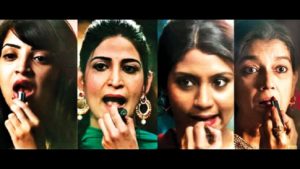
Image credits – Firstpost
So do I also like watching women suffer in films? Did I like watching Bandit Queen? I don’t know. But it was a story that I’m glad I got to watch. And I was thrilled that a category of rape and revenge films already existed on the internet and that it wasn’t just something that lived in my head.
***
I struggled before I was able to wear a swimming costume and stand before the mirror. It felt strange. It took me days before I could feel invisible in the pool. And to add to that, my father started hiding my swimming costume – either because he thought I should get another one – one that would fully cover my body or because he wanted me to go only to an all-women’s pool.
Either way, I had to wake up every morning, and run around looking for my swimming costume. Then when I found it, I didn’t feel the need to confront him. Because he’s not the villain in my life. At least not the only villain in my life. In much the same way, the many boys who smirk at me when I talk about feminism in classes aren’t the only villains in my life.
Swimming then became a very political thing for me to do. Like writing.
So when the 55 year old Usha Parmar wore a swimming costume and stood nimbly before the mirror, the audience rooted for her (judging by the loud cheers and the yay buaji!) It was a deeply political moment for me.
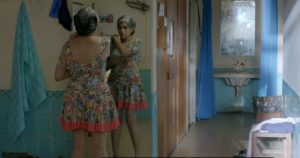
Image credits: twipost.com
Then when the camera lingered a little too heavily on her coach’s body (the young man she’s attracted to) – the audience erupted into giggles. Ok, I thought. It’s not like I didn’t laugh when Anupam Kher and buaji elaborately flirted with each other over spilled roses in DDLJ.
And then when Usha climaxed during phone sex, there were loud tawa-fry type disapproving hisses.
I inhaled sharply, as did many others in my row. And granny’s husband simply muttered something about “these roles” being offered only to theatre actresses.
***
Two people I spoke to said that it felt like they had watched the film before and so they were bored.
Have I watched a film like this before that tells me stories of women? – Rarely. Once every year, perhaps. Maybe only at film festivals.
The 2010 Egyptian film by director Mohamed Diab, 678 comes to mind. Wajda, Dukhtar, Where Do we Go Now are other films that loop in.
Closer home – Yashogathe (2016) and Queen (2014) come to mind. And then it’s blank for a while before another name pops up after 30 minutes.
Someone else I spoke to said that the characters weren’t new and that she has seen them before in other films dealing with more or less the same problems.
Maybe that’s true.
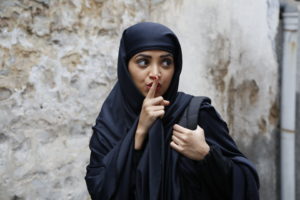
Image credits – unbumf.com
The two Muslim women who hide their desires inside Burkhas and bags are not entirely unfamiliar. Under her Burkha, Rehana (Plabita Borthakur) is not the girl that her parents know. Her bedroom has pictures of Mariah Carey that she unhides when alone. She jumps out of the window to attend events that her double life demands.
Shirin Aslam (Konkona Sen) hides her job in a handbag. She’s a salesgirl whose husband cannot know that she is working and has all manner of products in her bag (a pistol for cockroaches, a risqué – looking mouth massager.)
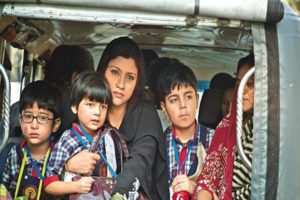
Image credits – Livemint
Usha Parmar wants the kind of desire that the character Rosy from Lipstick Wale Sapne (a that-type Hindi novel that she secretively reads) seems to have and know.

Image credits – Deccan Chronicle
Leela (Aahana Kumra) and Arshad (Vikrant Massey) want to become business partners like Shruti – Bittoo (Band Bajaa Baraat) and often choose unconventional locations for loud union–store rooms and toilets usually. But she is engaged to someone who has promised her mother a house and a life that will get her mother out of having to work as a nude model.
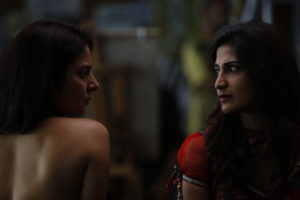
Image Credits: miamifilmfestival.com
Even if they are xeroxes of worse stereotypes, is the sameness of female characters a problem especially when we get to see them only very rarely and sometimes, at film festivals?
What are the men in the film doing, asked many people. Let’s see – one rapes, another threatens to call his friends to rape, one gets a girl pregnant and dumps her, and a bunch of other men slut-shame a woman for having desire.
The only decent chap is Leela’s fiancé whose vice is that he checked her phone.
But one reviewer wonders if the men in the film are even actual human beings.
This story is not set inside a women’s bathroom so why is anyone not female such shit, she wants to know. And then she says that the men were no more than ‘cardboard stereotypes.’
Maybe we can have a wholesome answer to the cardboard stereotype problem if we ask ourselves what the men who were watching the film doing.
Day 1, Garuda Mall –
Scene 1– Shirin is trying to tell her husband that she got a microwave oven and that she has started to work. She keeps offering him cake. Husband asks for the remote. When she hands it to him, he throws it away and then slides her hand down his crotch.
Real life man in the audience #1: Le saali, cake mooh me le (Take it, expletive; take the cake in your mouth).
Same scene, Day 2, Garuda Mall –
Real life man in the audience # 2: Loud, rapturous cheering.
Scene 2 – Shirin’s husband rapes her.
Real life man in the audience #3: I-pill khana mat bhoolna (Don’t forget to take an I-pill)
Real life man in the audience # 4: zhor se! (More vigour!)
Scene 3 – Usha Pawar undoes her blouse buttons.
Real life man in the audience # 5: Abe budiya, kya dhoond rahi hai blouse main? (Old woman, what are you looking for in the blouse?)
After this, must the scriptwriter feel guilty about not taking real life men into account?
The reviewer adds -“Slotting men so narrowly amounts to discrimination and what kind of feminism is it, which discriminates? I live in a world that treats me in problematic ways, yes. But I am not so weak that I need to believe that every man is a monster/imbecile.” Hmm.
Even so, let me quote Zoe Heller who said it best in this review of Gone Girl – are fictional characters required to act as goodwill ambassadors for their gender?
***
Speaking of her great-grandmother in The House on Mango Street, author Sandra Cisneros had said,
‘She was a wild horse of a woman, so wild she wouldn’t marry. Until my great-grandfather threw a sack over her head and carried her off. Just like that, as if she were a fancy chandelier. That’s the way he did it. And the story goes she never forgave him. She looked out the window her whole life, the way so many women sit their sadness on an elbow.’
When I first read this, I recalled that scene in DDLJ where Farida Jalal and Kajol sit by the window – Jalal begging for her daughter’s happiness.
I grew to dislike this scene and remember forwarding it blankly, sometimes even unconsciously. But I loved the Cisneros lines just as much as I hated it because I became perpetually afraid of a fate that would have me sit my sadness on elbows.
None of the four women in Lipstick under My Burkha sit their sadness on their elbows. They jump out the window even if they have to come back to it later. And when they do come back, they get ‘caught.’
After they have each been ‘shown their place’, they sit in Rihana’s father’s Burkha shop and gather buaji’s lurid kitaaben – which have been ripped apart and dumped in the courtyard along with her swimming costume. And here, they pick up their own stories (also ripped) and talk. Leela begins to look for the cover of the book that we have seen buaji read through the film. What she finds is an assortment of covers – dreams: Racedriver wale sapne, Mohabbat aur lust wale sapne. It doesn’t matter that they didn’t escape, run wild or fight. They sat down, next to the broken face of a mannequin – all these women — and smoked and talked of dreams. They seemed more interested in their own stories than in being goodwill ambassadors to anybody else’s.
This is perhaps why I’d go watch it again and again.
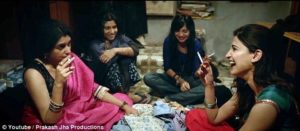
Image credits – scoopwhoop
***
Latest posts by Vijeta Kumar (see all)
- It was supposed to be Pascal’s Triangle but you two came - 2nd December 2024
- A review of Mother steals a bicycle and other stories - 17th November 2018
- What happened when Bengaluru’s working class women had a #MeToo meeting? - 7th November 2018






Surbhi 7th September 2017
This is so well written, thank you. I absolutely love what you said about windows and elbows. It was a sad thing indeed.
I love the fact that this movie celebrated the tiny rebellions of women in daily life. Who cares if they do not revolt. They do one better, they support each other.
free fire diamond hack 26th September 2021
Woah! I’m really loving the template/theme of this site.
It’s simple, yet effective. A lot of times it’s very
difficult to get that “perfect balance” between user friendliness and appearance.
I must say that you’ve done a amazing job with
this. In addition, the blog loads super fast for me on Safari.
Exceptional Blog visit free fire hack diamond !
free fire hack diamond 25th October 2021
Wow, fantastic weblog format! How long have you been running a blog for?
you made blogging look easy. The overall look of your site free fire diamond hack is excellent, as neatly as the content!